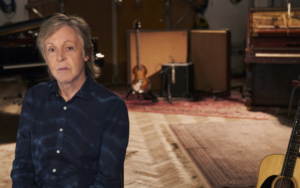IF THESE WALLS COULD SING: 3 STARS. “nostalgia dolled up in a pretty package.”
 Liam Gallagher calls it “a national treasure.” “Music seeps from the walls,” said Elton John. Film, composer John Williams called it the “mother of the music that was birthed there.”
Liam Gallagher calls it “a national treasure.” “Music seeps from the walls,” said Elton John. Film, composer John Williams called it the “mother of the music that was birthed there.”
The place is London’s Abbey Road Studios, one of the most famous recording studios in the world, and the subject of “If These Walls Could Sing,” a new documentary/hagiography now streaming on Disney+, directed by Mary McCartney, eldest child of Paul McCartney and Linda Eastman.
From playing home to everyone from cellist Pablo Casals and Cliff Richard to Pink Floyd and Kate Bush to Fela Kuti and all the above-mentioned stars to, of course, the Beatles and so many other 20th and 21st century luminaries, the studio has made an indelible impact on recording arts and popular culture.
Broken into sections defined by era, McCartney presents an engaging nuts and bolts history of the studio, from its grand opening in 1931 to early rock and roll, to the heady days of Beatlemania and onwards to the young artists who create new music there, while soaking up the vibes of everyone who came before. The mix of archival footage, music and talking heads from the musicians who recorded there, paints an affectionate and informative portrait of the people and the place.
The stories are fun. Did you know Jimmy Page of Led Zeppelin played acoustic guitar on Shirley Bassey’s “Goldfinger” in Abbey Road’s Studio Two? That Linda Eastman brought a pony named Jet, who would later inspire the famous Wings’ song, to the studio? That Elton John, then still called Reginald Dwight, played piano on The Hollies’ “He Ain’t Heavy, He’s My Brother”?
There are more tales from the recording studio, by-and-large, told by those who made the music, including Kanye West in a segment obviously shot some time ago, but the movie lacks real depth. When Paul McCartney is asked what makes Abbey Road so special, he says, “It’s a great studio. All the microphones work. It sounds silly but you go to some studios…” It’s not the most illuminating answer, but if you want details, John Williams goes deeper later in the film, describing the studio’s “nice face” and “nice sound.”
“It’s a gift to music,” he says. “I have to tell you.”
“If These Walls Could Sing” is nostalgia dolled up in a pretty package, with all the rough edges shorn off. Rock docs probably shouldn’t be this respectful, still, as music movies go, this one mines rich, entertaining territory.
